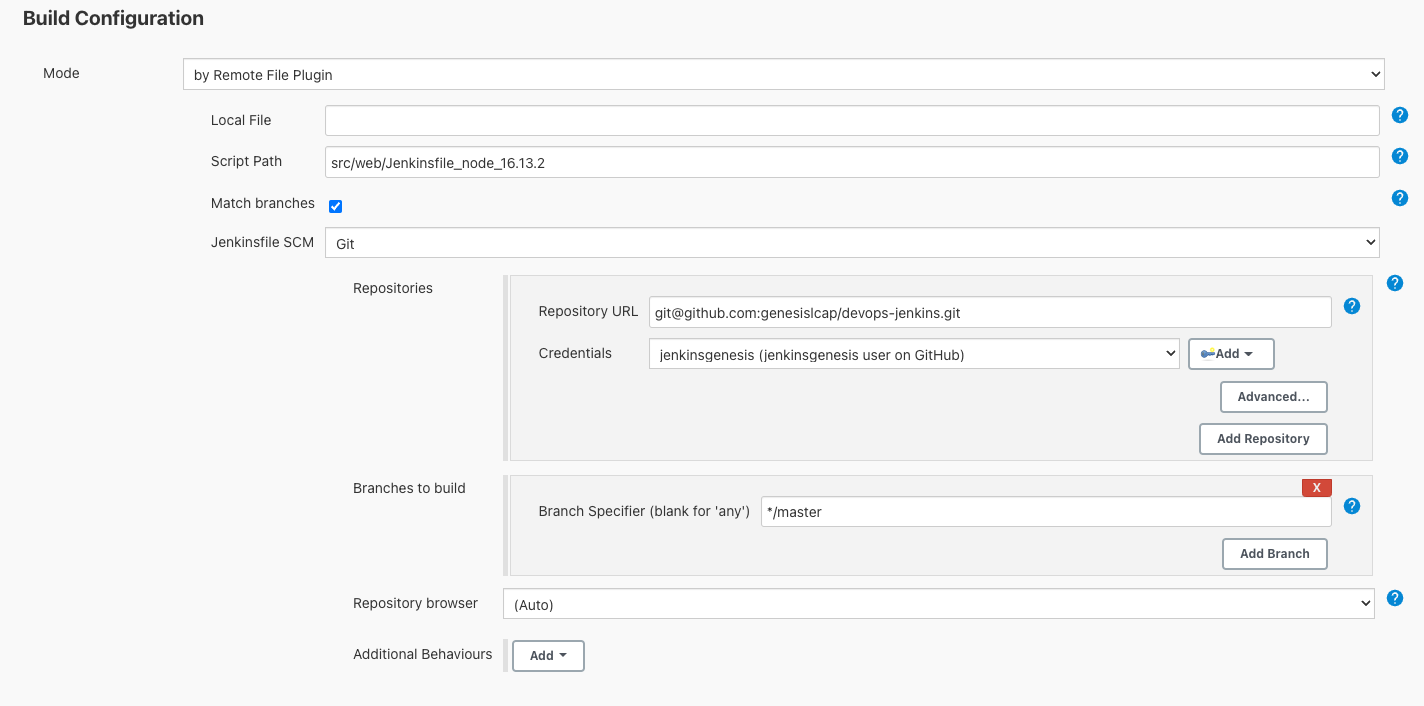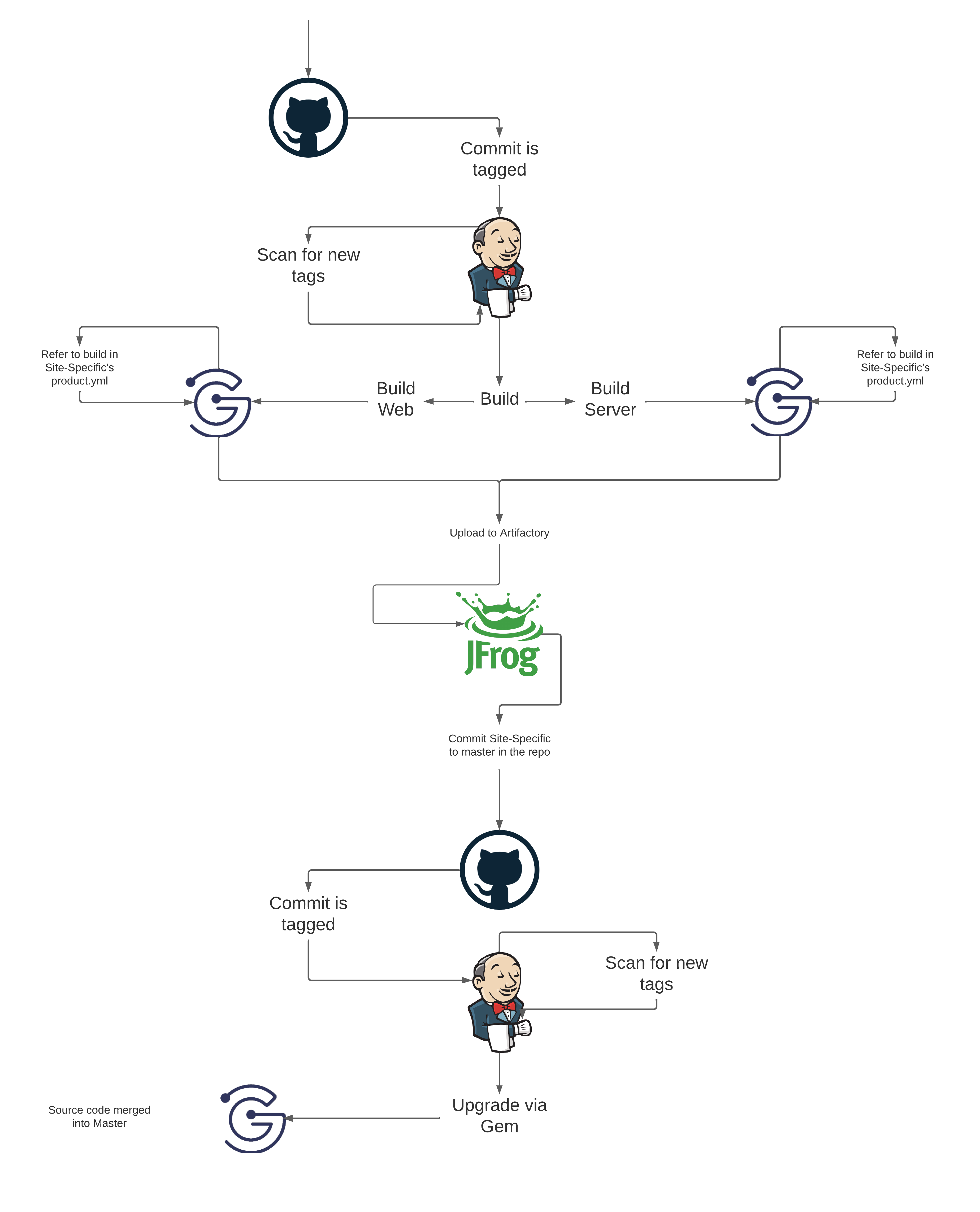Web deployment - automated
Ideally, an automated pipeline such as a github workflow should be put in place to build, test and deploy the front end every time the master or develop branches are updated.
It can be configured to run automatically when something is merged into certain branches or even triggered manually.
github
Here is an example of a github workflow, which can trigger a deployment by the click of a button (running the action on github).:
# For more information see: https://help.github.com/actions/language-and-framework-guides/using-nodejs-with-github-actions
name: GHpages
# Manually triggered
on:
workflow_dispatch:
jobs:
build:
runs-on: ubuntu-latest
strategy:
matrix:
node-version: [20.x]
# See supported Node.js release schedule at https://nodejs.org/en/about/releases/
steps:
- uses: actions/checkout@v2
- name: Configure Node ${{ matrix.node-version }}
uses: actions/setup-node@v2
with:
node-version: ${{ matrix.node-version }}
- name: Bootstrap
working-directory: ./client
run: npm run bootstrap
- name: Build
working-directory: ./client/web
run: npm run build
- name: GitHub Pages action
# You may pin to the exact commit or the version.
# uses: peaceiris/actions-gh-pages@bbdfb200618d235585ad98e965f4aafc39b4c501
uses: peaceiris/actions-gh-pages@v3.7.3
with:
publish_dir: ../client/web/dist
github_token: ${{secrets.GITHUB_TOKEN}}
Jenkins
Here is an example, this time of a Jenkins pipeline, to build commits that are tagged with a version and upload them to jfrog / artifactory.
It will also run SonarQube analysis and send notifications using Office 365 webhooks. It will likely have to be adjusted based on project setup and external infrastructure.

pipeline {
agent { label 'centos_7_clean_core' }
tools {
nodejs '20.10.0'
}
environment {
REPO_NAME = sh (
script: 'git config --get remote.origin.url | cut -d"." -f2 | cut -d"/" -f2 | xargs',
returnStdout: true
).trim()
PRODUCT_NAME = sh (
script: 'git config --get remote.origin.url | cut -d"." -f2 | cut -d"/" -f2 | cut -d"-" -f1 | xargs',
returnStdout: true
).trim()
PRODUCT_BASE = sh (
script: 'pwd',
returnStdout: true
).trim()
PACKAGE_NAME = sh (
script: 'grep outputPath $(find . -name angular.json) | cut -d"/" -f2 | rev | cut -c3- | rev',
returnStdout: true
).trim()
VERSION = sh (
script: 'git describe --tags',
returnStdout: true
).trim()
WEBHOOKURL = env.getProperty("${PRODUCT_NAME}-webhookURL")
}
stages {
stage('InstallBuildDependencies') {
environment {
ARTIFACTORY_CREDENTIALS = credentials('NPM_Artifactory')
}
steps {
echo 'Installing build dependencies...'
sh '''
echo "sonar.projectKey="$REPO_NAME > sonar-project.properties
echo "sonar.sources="$PRODUCT_BASE"/src" >> sonar-project.properties
cp ${ARTIFACTORY_CREDENTIALS} ~/.npmrc
chmod 664 ~/.npmrc
npm config set @genesisglobal:registry https://genesisglobal.jfrog.io/artifactory/api/npm/npm-local/
npm install
'''
}
}
stage('Build prod') {
steps {
echo 'Building prod...'
sh '''
export NODE_OPTIONS=--max_old_space_size=12288
npm run build
'''
}
}
stage('Package') {
steps {
echo 'Creating a deploy package...'
sh '''
sudo yum -y install zip
output=$PRODUCT_NAME-web-$VERSION.zip
cd www
zip -r $PRODUCT_BASE/$output *
'''
}
}
stage('Deploy') {
steps {
echo 'Deploying...'
script{
output = "${PRODUCT_NAME}-web-${VERSION}.zip"
def server = Artifactory.server 'genesisartifactory'
def uploadSpec = """{
"files": [
{
"pattern": "${PRODUCT_BASE}/${output}",
"target": "product/${PRODUCT_NAME}/web/${output}"
}
]
}"""
def buildInfo = server.upload uploadSpec
server.publishBuildInfo buildInfo
if (env.WEBHOOKURL != "") {
office365ConnectorSend message: "Deployed", webhookUrl: "${WEBHOOKURL}"
}
}
}
}
stage('SonarQube analysis') {
environment {
SCANNER_HOME = tool 'SonarQube_4.5.0'
}
steps {
withSonarQubeEnv('SonarQube1') {
sh '''$SCANNER_HOME/bin/sonar-scanner \
-Dsonar.login="admin" \
-Dsonar.password="************"'''
}
}
}
stage("Dependency Check") {
steps {
dependencycheck additionalArguments: '--out dependency-check-repo_namert.xml --format XML', odcInstallation: '6.0.2'
dependencyCheckPublisher pattern: 'dependency-check-repo_namert.xml'
catchError {
echo 'Dependecy check failed'
}
}
}
}
post {
always {
echo 'One way or another, I have finished'
deleteDir() /* clean up our workspace */
}
failure {
script{
if (env.WEBHOOKURL != "") {
office365ConnectorSend status: "Failure", webhookUrl: "${WEBHOOKURL}", color: "d00000"
}
}
}
success {
script{
if (env.WEBHOOKURL != "") {
office365ConnectorSend status: "Success", webhookUrl: "${WEBHOOKURL}"
}
}
}
}
}
The generated builds can then be fetched and moved to the correct location on the webserver with another script or manually.
What the full pipeline might look like
